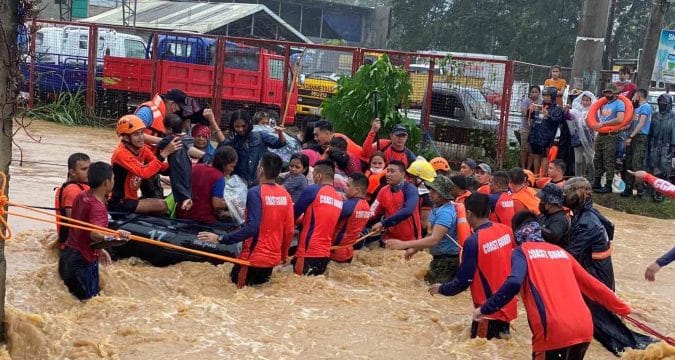
UCAN
Father Ricardo Virtudazo stood in a pool of water in his typhoon-hit church in the southern Philippines, as he celebrated Christmas Day Mass for dozens of people whose wishes this year were for new roofs, food and fine weather.
More than a week after Super Typhoon Rai [Odette in the Philippines] cut a swathe through the archipelago, killing nearly 400 people and leaving hundreds of thousands homeless, survivors clung to family and faith after their homes—and planned festivities—were wiped out.
“What’s important is all of us are safe,” said 31-year-old Joy Parera, who attended Christmas Mass with her husband at San Isidro Labrador Church in the town of Alegria, on the northern tip of Mindanao island.
A light rain soaked the pews and white tiled floor of the damaged church, which has been left with a gaping hole in the roof after Typhoon Rai ravaged the area.
People wore masks as they gathered inside the church festooned with Christmas decorations and prayed for a better year.
“We still have hope,” Virtudazo said, adding, “In spite of the calamities they experience, they still have faith in God.”
Christmas is one of the most important events in the Christian calendar and in the Philippines, families typically gather to share a meal.
But the widespread destruction caused by the typhoon in the southern and central regions of the country has dampened celebrations as many survivors plead for drinking water and food.
As we celebrate the 500 years of Christianity in the Philippines. The Chaplaincy to Filipino Migrants organises an on-line talk every Tuesday at 9.00pm. You can join us at:
https://www.Facebook.com/CFM-Gifted-to-give-101039001847033
Mindanao, Siargao, Dinagat and Bohol islands are among the most devastated by the storm, which knocked out electricity, tore off roofs, shredded wooden buildings, felled concrete power poles and uprooted trees.
The scale of the damage, lack of mobile phone signals or Internet in many areas, as well as depleted government coffers, resulting from the Covid-19 response, hampered efforts to distribute aid.
‘We’ll make do with spaghetti’
Nardel Vicente said his Christmas wish was for someone to help him buy a new roof for his house in Alegria.
Jobless and with little money to spare, Vicente said his family were not able to prepare a festive meal this year.
“In previous years we had spaghetti, pork, chicken—whatever we could afford between us,” the 38-year-old said.
But he added: “That’s ok— we’re alive. It’s better than welcoming Christmas with a dead loved one.”
Marites Sotis usually serves up meat, spring rolls and salad for her family.
“We won’t have those this year because they cost a lot of money,” Sotis, 53, said in the coastal municipality of Placer where the storm felled most of her family’s coconut trees.
“We’ll make do with spaghetti.”
Some survivors in nearby Surigao City have been standing on roads for days begging for money and food from passing motorists after failing to receive a scrap of government assistance.
Inaga Edulzura, said she hoped to get a packet of spaghetti to cook for her family. Otherwise, they would “make do with sliced bread.”
The 41-year-old said the their only request was for good weather on Christmas day.
“That and some food.”
Meanwhile, CBCP News reported that Archbishop Charles Brown, the apostolic nuncio to the Philippines, spent his Christmas in Siargao Island with the survivors of Typhoon Rai.
He celebrated Mass at San Nicolas de Tolentino Cathedral and was to visit several parishes throughout the day.
He was scheduled to visit Dinagat Island before returning ion December 28.








